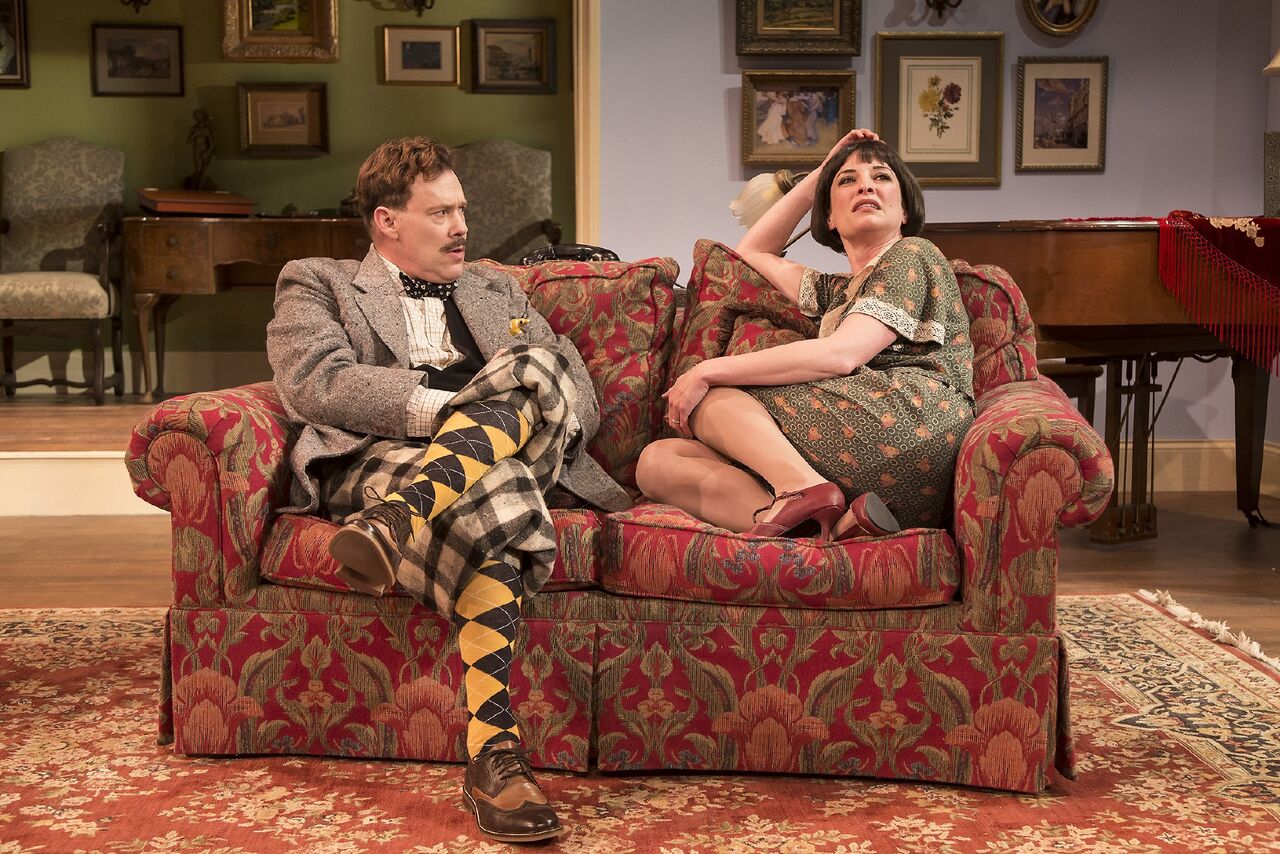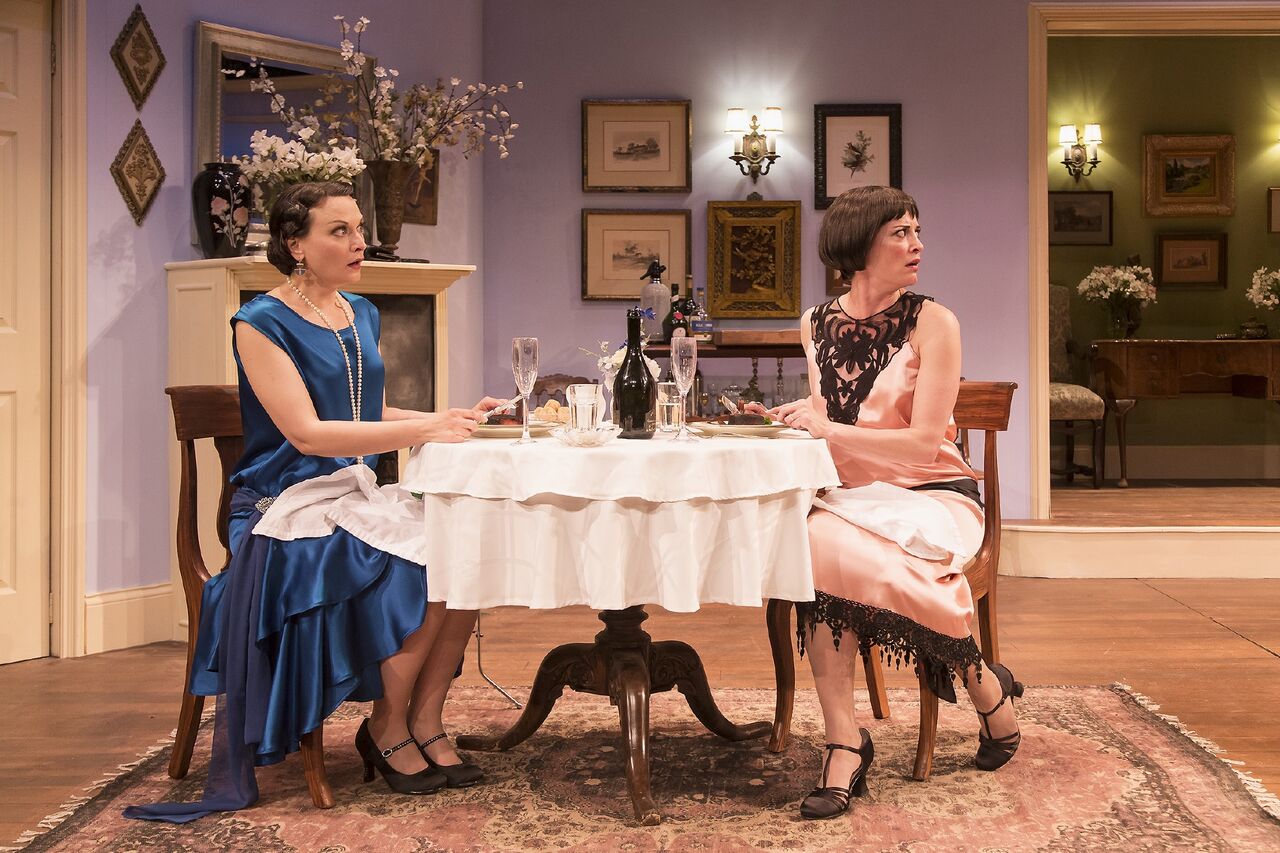Review-
Noël Coward’s Fallen Angels delivers at The Ensemble Theatre
A hilariously witty script, superb cast, first-rate production and direction, who could ask for more? A reviewer of its 1925 premier complained that the only thing wrong with Fallen Angels is the final curtain. Ditto for the Ensemble Theatre of Santa Barbara’s current production of the Noël Coward classic.

Joseph Fuqua and Paige Lindsey White
Early in 1925, Noël Coward’s break-out year, Coward’s The Vortex, which was actually written after Fallen Angels, opened to overwhelming box-office success in both London and the United States, creating a huge demand for Noël Coward plays.
Fallen Angels is in fact one of Coward’s earliest plays, but was held back because producers thought the material a bit too dodgy. With the momentum and money of a double-smash hit on his hands, Coward quickly launched Fallen Angels in London’s newly developing West End before The Vortex even closed.
The Manchester Guardian guardedly warned that the three-act farce was no more than “the spectacle of two middle-aged women slowly getting drunk while awaiting the arrival of their mutual lover.”
This deliciously dramatic set-up only increased the demand for tickets and a fervor for more Noël Coward material. By by the end of 1925 Coward had no less than four major productions playing at the same time in London’s West End: The Vortex, Fallen Angels, Hay Fever, and On with the Dance.
No mean achievement in any era. But Coward did not slow down: by the end of the year he had also written one of his most loved and produced plays of all time, Easy Virtue, further extending themes touched on in Fallen Angels.
In one of those quirks of theatre history, perhaps because of timing and being overshadowed at the time by plays such as Easy Virtue, Fallen Angels has not been one of Coward’s most frequently produced plays, but in some ways it is one of his best.
Fallen Angels plays well to contemporary audiences as it depends on timeless desires and emotions surrounding relationships between women and men flavored with a tasteful dose of cynicism heavily salted by Coward’s famous wit.
One of the things that Coward did very well was write fantastic parts for women, and Fallen Angles has three of his best. This has attracted some of the greatest female comic talents in theatre history: Tallulah Bankhead, Gingold and Baddeley in a famous 1949 production, and Nancy Walker in the late 60s.
The play rides on the duo of Julia Sterroll and Jane Banbury, the two drunken women in the Guardian’s notices, played at full tilt by Page Lindsey White and Julie Granata, complemented by one of Coward’s most wonderful comic inventions, Julia’s maid, Saunders, played with absolute comic brilliance by Mary-Pat Green, who has played the part several times before. Green’s familiarity with the part shows to great advantage with a wonderfully matured interpretation already fully prepared by opening night with the deft timing required for a live audience.

Rounding out the cast with superb ensemble work throughout is Joseph Fuqua playing Julia’s husband Fred, and a perfectly proper Willy Banbury played by Matthew Floyd Miller. Maurice Duclos, the mysterious man the women are waiting for is played by J. Paul Boehmer, whose mere entrance brings down the house. It is a wonderful cast throughout, all three women are terrific. So are the costumes and set.
This is a can’t miss production of one of the last century’s most entertaining and funniest plays.
Noël Coward always insisted that theatre was first and foremost intended to entertain, and his wit, genius for character, firm construction and timing frequently delivered.
Not born, but introduced as a teenager into high society, Noël Coward found high society London a life-long source for material. Coward was happy to reveal how easily conventional middle-class morality was all too willingly thrown to the wind whenever convenient by those with sufficient wealth, status, and power to do so.
As times changed and his plays appeared less scandalous, it was increasingly recognized that his best work contained significant emotional truths and a sense of humor that ensured its universality and continued presence in the canon.
Fallen Angels and 1925 were an auspicious beginning to a long, multi-faceted career that included running the British propaganda office in Paris at the end of World War II, developing a well-known distinctive personal style and a lifelong reputation for flamboyant living. Coward was knighted in 1962, elected a fellow of the Royal Society of Literature, and received a Tony Award for lifetime achievement in 1972.
During the early part of World War II, Coward worked secretly for British intelligence to get America involved in helping the British war effort. At the same time, back in London, he had a hugely successful comedy, Blithe Spirit, open in 1941, featuring a novelist intrigued by the occult who hires a medium for a seance which brings back his first wife’s ghost, causing hilarious havoc for the novelist and his second wife. Blithe Spirit ran for 1997 consecutive performances, breaking box-office records for a West End comedy. It later ran on Broadway for 650 performances and was adapted to film in 1945. A rather spectacular cover for a secret agent; not exactly lying low, which led to a few choice comments from Churchill.
In the post-War era, a few Coward comedies have enjoyed continued presence in the English and American repetoire. Fallen Angels more than deserves to be in that company. This is the first Noël Coward play that ETC has put on in almost twenty years and the only thing wrong with that is, what in the world took so long?
__________________
Fallen Angels by Noël Coward
Directed by Andrew Barnicle,
Starring Paige Lindsey White, Joseph Fuqua, Mary-Pat Green, Matthew Floyd Miller, Julie Granata, and J. Paul Boehmer
with Dianne K. Graebner, costume design; Bruce Goodrich, scenic design; Pablo Santiago, lighting design; Avery Wheeler, sound design; Anna Jensen, dramturgyy; Aleah Van Woert, state management.
Presented by The Ensemble Theatre Company at the New Vic
32 West Victoria Street, Santa Barbara, California.
box office at This email address is being protected from spambots. You need JavaScript enabled to view it., 805.965.5400
playing through 26 June 2016

